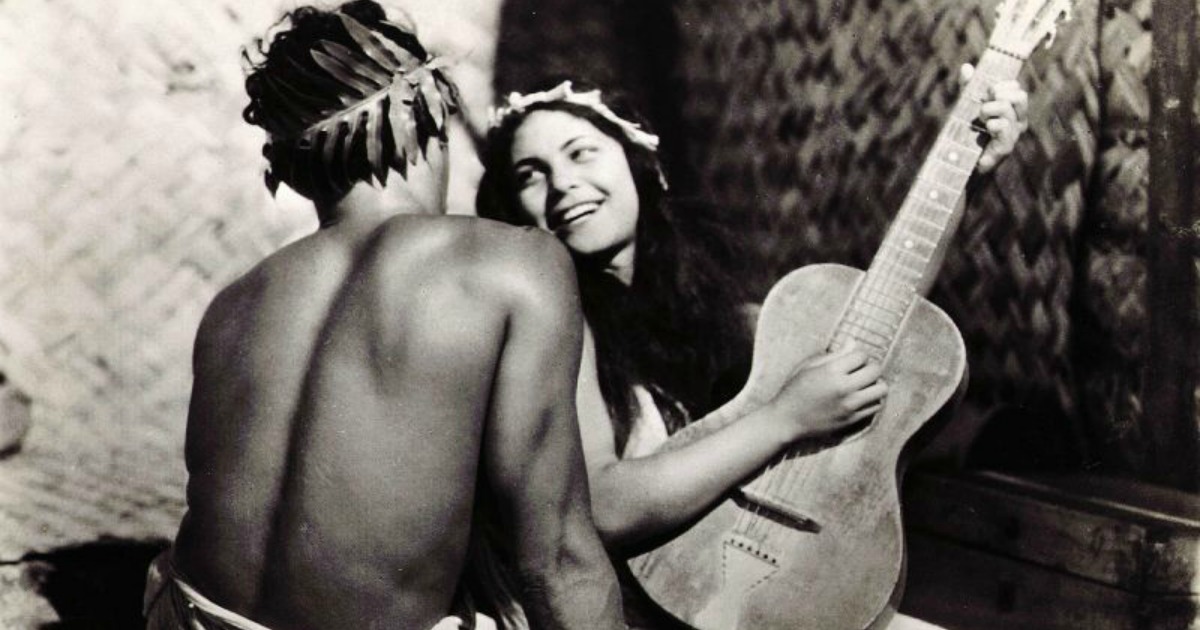By 1931, nearly the entirety of the film industry had not only gained the capabilities to make sound pictures, but appeared to leave silent cinema completely behind. Save for a few iconic artists like Charlie Chaplin, who stuck with silent cinema aesthetics for quite some time after the growth of sound in cinema, the medium had all but shifted into both sound storytelling, and the stationary camera that it would need.
And then there is Tabu. From not only one, but two of those iconic artists mentioned in the paragraph above, this brisk and powerful journey into the South Seas was created by the pair of F.W. Murnau and Nanook of the North director Robert J. Flaherty, and tells a story only these two legendary filmmakers could. Blending both Murnau’s beautiful, expressionistic filmmaking with the cultural focus that made the heart of Flaherty’s work beat, Tabu became a film that not only broke ground in an age where cinema just caged itself in by an assumed technological advance, but also helped usher in a type of cinematic naturalism that would forever change the language of cinema.
A full four years removed from his landmark Hollywood-backed masterpiece Sunrise, Murnau joined forces with Flaherty to tell the story of Matahi, a pearl fisherman caught in a romantic net by Reri, a beautiful young woman. When their romance is threatened not only by her tribe putting the tag of priestess on her but also a civilization that seems to be encroaching more and more upon their lives. Shot over nearly a year in Tahiti and using a collection of non-professional actors, this tale of romance doomed by existential circumstances is a startling achievement of the highest order.
Now available on Blu-ray from Kino Lorber, there’s quite a bit of history to dive into with regards to this film, before looking at it critically. So this review is going to be reversed, in a way. Let’s look at the disc itself first.
Ostensibly the same transfer as the Masters of Cinema release from a couple of years ago, so that means it’s in the ratio of 1.19:1, not the original 1.33:1. Previous incarnations of this film on home video have been in 1.33:1, and yes, this is without a doubt the best this film has looked in decades. Shot over the span of nine months, the film not only uses local, non-professional talent, but some of the most beautiful locations you’ll see in any film of this period. Throughout this release there are numerous collections of outtakes and raw camera footage, thanks to the teams at Osterreichisches Filmmuseum Wien, Cineteca del Comune di Bologna and Deutsche Kinemathek respectively. Hunt in the South Seas is included here, which itself is a beautiful edit of unused footage from Murnau’s film, ultimately turning into a rather powerful short which plays wonderfully as both a companion to this film and a precursor to modern ethnographic storytelling. Toss in a documentary looking deeper at the making and restoration of the film, and you have a collection of supplemental material that adds great depth to an already startling achievement. Again, this is ostensibly a port of the Masters of Cinema release, so if one already owns that great disc, there isn’t much in the way of new material here. (For more on the Masters of Cinema release, read Scott’s fantastic review
That being said, if you don’t have a copy of Tabu on home video, or haven’t even seen this masterful picture, do yourself a favor and buy this release. Murnau and Flaherty do wonders together here. At face value, the story doesn’t have much weight. As a premise, the idea of a romance being born and then having to face an oncoming existential crisis isn’t one all that rare, particularly in silent cinema, and especially in films from Murnau at this period. Just four years prior he made what may be the greatest romance picture of all time, Sunrise, and where that film seems entirely surreal and indulging in all of Murnau’s expressionist desires, this takes Flaherty’s poetic realism and blends the two into something truly awe-inspiring. This isn’t as grand or as baroque as a film like The Last Laugh or as focused on mood and atmosphere like a Nosferatu, but what it is is extremely inspired by the setting from which its narrative is drawn. Murnau allows his camera to be thrust directly into the middle of the action, with thrilling action-based set pieces paired opposite some evocative and powerful dance sequences, all embedding the viewer into this singular world. The central relationship here is one that is told through actions and glances, something much more resonant than any other romance picture of this period. Where love affairs were told through bombastic proclamations turning romance films into something much more maudlin, this film stays thrilling from the first to final frame. It’s also an important piece in Flaherty’s career, and proof that he may be as important a filmmaker today as Murnau, or any of his contemporaries. In an age where ethnographic documentaries are some of the most entrancing documentaries we see arrive in theaters, films like Leviathan owe a great deal to Flaherty’s poetic realism, as they have simply evolved the form, distilling it to its most primal, its most elemental.
For those with a Region-locked Blu-ray player, this Kino Lorber port of Masters of Cinema’s 2013 release of F.W. Murnau’s brilliant Tabu is an absolute must own. With superb supplements and a transfer that breathes new life into a film that many cinephiles haven’t had the chance to view, this is a Blu-ray that should be on any film nerd’s holiday wish list.



